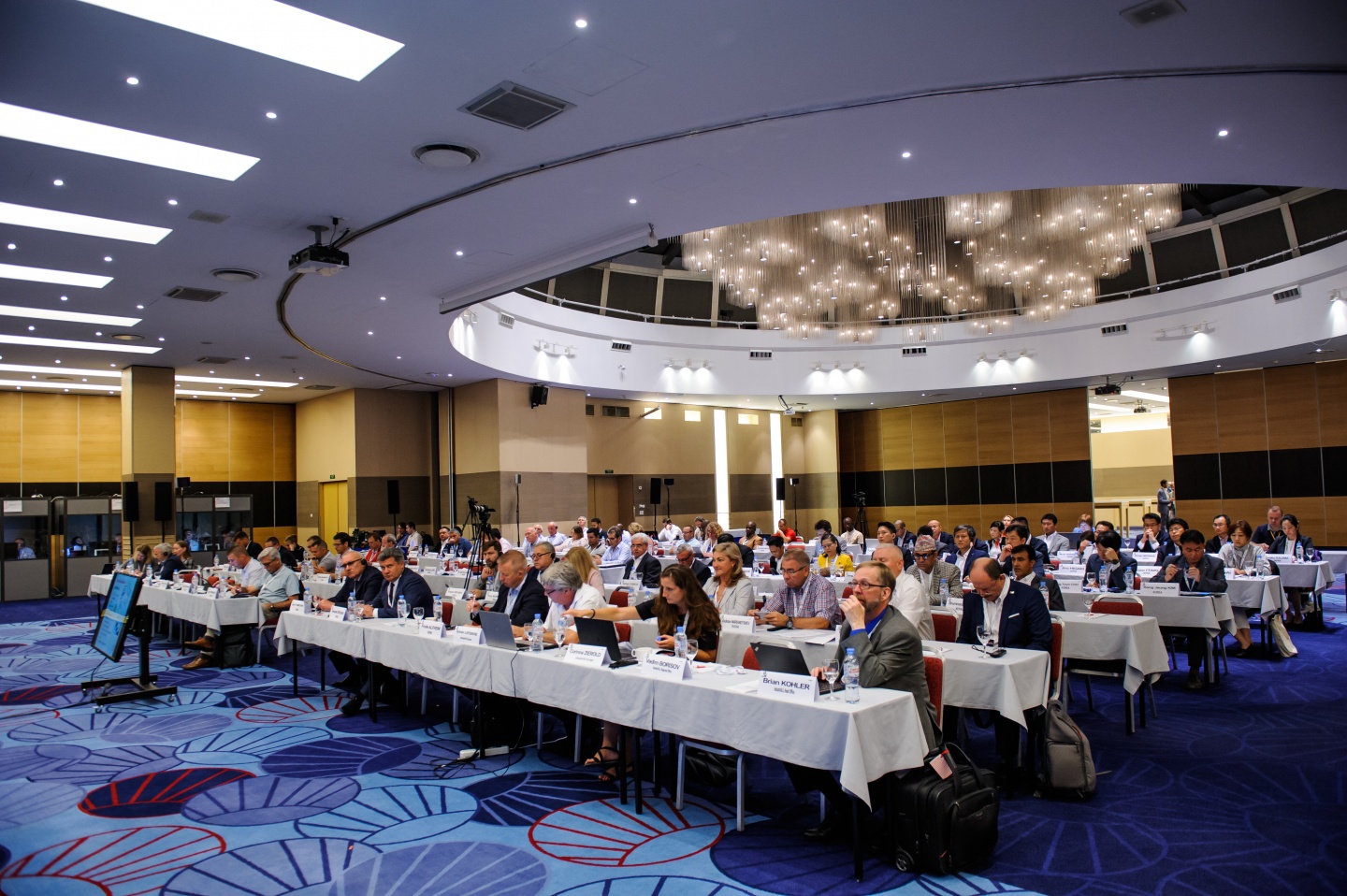25 July, 2018Countries need to develop sustainable, mixed energy policies to ensure a continuous power supply, said representatives of trade unions representing electricity and nuclear workers meeting in St Petersburg, Russia, on 24 July.
Yury Ofitserov, president of the All-Russian Electric Trade Union, welcomed more than 100 participants from 25 countries to IndustriALL’s global meeting of electricity and nuclear sectors.
Energy policies need to be consistent and cannot change with every government, said unions at the meeting.
Electricity consumption has more than doubled since 1990 and there are still 1.1 billion people without access to power. However, despite the growing demand for electricity, it will require fewer workers than before. Many participants said securing a Just Transition for workers whose jobs are threatened is a major challenge.
Union representatives debated the impacts of deregulation, privatization and market liberalization on employment and unions. Before privatization there were only ten companies in the electricity sector in Japan, now there are 500, while electricity prices have increased 16 per cent for households and 21 per cent for industry.
In Mexico, 44,000 workers lost their jobs when the public electricity supply was privatized in 2009. Unions have been fighting this decision every since. Elsewhere, in Zimbabwe, 30,000 workers have been laid off following privatization and the people who are kept on are mostly young and inexperienced with low salaries.
The second half of the meeting was devoted to nuclear energy, which generates 10.6 per cent of the world’s energy supply. However, in some countries, nuclear energy dominates, such as in France where 220,000 workers are employed in the sector. Nonetheless, funding and investment is needed to maintain plants and jobs, and France is looking to decrease its reliance on nuclear energy.
While Turkey is to build three new power plants, elsewhere, countries are phasing out nuclear power. For example, in Belgium, 7,000 jobs will be lost when its three power plants are decommissioned by 2025.
Igor Fomichov from the Russian Trade Union of Nuclear Power and Industry Workers said workers in the entirely state-owned sector are highly skilled and paid above average. The industry also generates many jobs in the building of infrastructure for plants. He said that the government has to make sure that nuclear power plants are safe because humankind would never forgive another catastrophe.
Ryouichi Hagiwara from Denryoku Soren union in Japan, said there had been considerable progress in the clean up seven years since the Fukushima nuclear disaster. He highlighted the need to design and build better power plants and have a proper decommissioning process.
In a discussion about INWUN – the International Nuclear Workers’ Unions Network, IndustriALL’s assistant general secretary, Kemal Özkan, said that its work needed to be scaled up to include the whole supply chain of the nuclear sector, including countries where uranium is produced. There is also a need to exchange information between countries who have nuclear power and those that are starting out in nuclear, such as Turkey and Kazakhstan.
Reflecting on the meeting, which was held on the eve of IndustriALL’s world energy conference, also in St Petersburg, Kemal Özkan, said:
“It is IndustriALL’s strategy to build union power in the energy industry’s sub-sectors through networks. Our affiliates in the electricity and nuclear sectors demonstrate clear commitment towards international cooperation and solidarity in these important parts of the energy industry. Following the high quality inputs and debates today, we have now a clear way forward in advancing global solidarity in nuclear sector and its supply chain.”


![IndustriALL.2018.DENISLEONOV.RU.[_DSC1123]](http://farm1.static.flickr.com/926/28731263857_6c0d22bf87_s.jpg)
![IndustriALL.2018.DENISLEONOV.RU.[_DSC1144]](http://farm1.static.flickr.com/842/28731261597_834cf7b93f_s.jpg)
![IndustriALL.2018.DENISLEONOV.RU.[_DSC1155]](http://farm1.static.flickr.com/859/28731260147_c6d6b43625_s.jpg)
![IndustriALL.2018.DENISLEONOV.RU.[_DSC1209]](http://farm1.static.flickr.com/942/41810537810_91f80b361d_s.jpg)
![IndustriALL.2018.DENISLEONOV.RU.[_DSC1233]](http://farm1.static.flickr.com/848/41810534210_6cba7e798a_s.jpg)
![IndustriALL.2018.DENISLEONOV.RU.[_DSC1303]](http://farm1.static.flickr.com/923/41810530910_ed7890e604_s.jpg)
![IndustriALL.2018.DENISLEONOV.RU.[_DSC1337]](http://farm1.static.flickr.com/940/41810527450_0d63cfaca8_s.jpg)
![IndustriALL.2018.DENISLEONOV.RU.[_DSC1340]](http://farm1.static.flickr.com/861/41810524310_99240506fc_s.jpg)
![IndustriALL.2018.DENISLEONOV.RU.[_DSC1344]](http://farm1.static.flickr.com/835/42714691785_08100bd684_s.jpg)